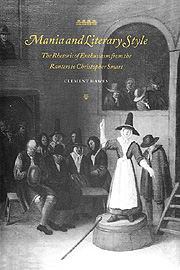Book contents
- Frontmatter
- Contents
- Acknowledgments
- Introduction: Mania as rhetoric
- PART I DEFIANT VOICE
- 1 “Howle, you great ones”: enthusiastic subjectivity as class rhetoric
- 2 “A huge loud voice”: levelling and the gendered body politic
- 3 Strange acts and prophetic pranks: apocalypse as process in Abiezer Coppe
- PART II PATRICIAN DIAGNOSIS
- PART III CHALLENGING LIMINALITY
- Epilogue: Beyond pathology
- Index
- CAMBRIDGE STUDIES IN EIGHTEENTH-CENTURY ENGLISH LITERATURE AND THOUGHT
1 - “Howle, you great ones”: enthusiastic subjectivity as class rhetoric
Published online by Cambridge University Press: 16 September 2009
- Frontmatter
- Contents
- Acknowledgments
- Introduction: Mania as rhetoric
- PART I DEFIANT VOICE
- 1 “Howle, you great ones”: enthusiastic subjectivity as class rhetoric
- 2 “A huge loud voice”: levelling and the gendered body politic
- 3 Strange acts and prophetic pranks: apocalypse as process in Abiezer Coppe
- PART II PATRICIAN DIAGNOSIS
- PART III CHALLENGING LIMINALITY
- Epilogue: Beyond pathology
- Index
- CAMBRIDGE STUDIES IN EIGHTEENTH-CENTURY ENGLISH LITERATURE AND THOUGHT
Summary
as you have, & doe in greedy and unrighteous manner heape up the Treasures of the Earth in your storehouses, to the building and raysing up of high wales of pride and Arrogancy, and nurturing the lusts of your pampered flesh … Howle, Howle & weepe, a day of Woe & misery is at hand and the Terrible Arme of the Lord is stretched foorth …
John Perrot, “The Lawyer's Fee” (1656)The most interesting criticism of Christopher Hill's The World Turned Upside Down may be Barry Reay's observation that it never really resolves “the wider issue of rationality.” As Reay points out, Hill wavers between a respect for seventeenth-century radical enthusiasts as seen in their own terms and an occasional tendency to see them as blinkered by their pre-scientific, pre-secular perspective. The question of individual irrationality, moreover, is handled in a tone of quizzical ambiguity. Hill offers a number of tentative explanations for the extent to which such enthusiasts play the role of holy madman, including the following: such enthusiasts are engrossing the attention of an unwilling audience; they are using a mask to simultaneously express and disown dangerous ideas; they are reflecting the sheer strain of their radical insights; and they are, in some cases – Thomas Tany and George Foster, perhaps – suffering an authentic mental breakdown. Though he drops hints that drawing a line between the rational and the mad may involve political and historical considerations, Hill leaves such hints studiously undeveloped.
- Type
- Chapter
- Information
- Mania and Literary StyleThe Rhetoric of Enthusiasm from the Ranters to Christopher Smart, pp. 25 - 49Publisher: Cambridge University PressPrint publication year: 1996
- 1
- Cited by



